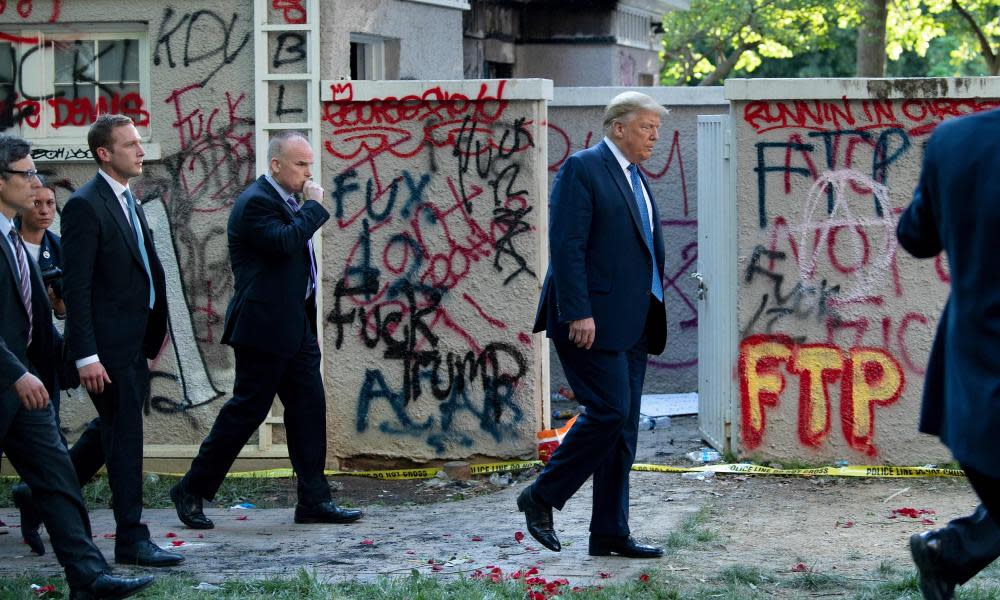Could the killing of George Floyd be a turning point for American denial?

It was Don DeLillo, the novelist, who in the wake of 9/11 said of America, “the culture absorbs almost everything”. It’s a conservative reflex – to co-opt any rebellion into the country’s existing idea of itself – and as protests against the death of George Floyd roiled this week, you could see that reflex in action. Instagram filled with solidarity from white people that sounded a lot like personal branding. Corporations with terrible hiring records put out statements about standing together. A friend who works for a big company, on receiving a lachrymose global email from her CEO, said drily, “What is he talking about? They don’t even give us Martin Luther King Day off.”
Related: Systemic racism and police brutality are British problems too | Kojo Koram
To see this effort to neutralise the protests fall flat has been one of many extraordinary moments this week. For the last few months, Covid-19 has been ruthlessly exposing fictions in the American ideal. All of a sudden, 40 million jobless Americans have no healthcare and the lie about “choice” in the “insurance marketplace” appears ludicrous. As wealthy, white Americans fled Covid-19 hotspots for their second homes, and low-income workers – the majority from communities of colour – bore the brunt of the death rate, the lie that the only difference between rich and poor is hard work and enterprise started to ring a little hollow.
The death of George Floyd, in this context, cannot be readily absorbed into existing myths. There is a lot of talk about this time being different, which always feels like the first step towards ensuring it isn’t. But I have lived in the US for more than 10 years, and this feels like the first time that the killing of a black man by police has not been met with equivocation and evasion.
Six years ago, when Michael Brown was shot dead by a police officer in Ferguson, Missouri, there was instant scepticism in the conservative press and elsewhere. What had Brown been doing to excite police interest in the first place? Are we sure the officer was at fault? There was no video, that time. But in the same year, the killing of Eric Garner by police officers in Staten Island was captured on video. There were large-scale protests in the wake of these killings – but the protests were accompanied by a lot of chatter, not just on the right, about the deaths being at the hands of bad apple police officers, rather than an expression of systemic racial injustice.
That is not happening now. No one who isn’t on the white nationalist fringe is suggesting Floyd brought this on himself. It feels, this time, as if a line has been crossed and not only because Floyd’s death occurred during a time of stark exposure of American inequality. It’s that it followed on, in short succession, from the killing of Ahmaud Arbery, a black man gunned down by white vigilantes while going for a run in Georgia, and from a superficially trivial encounter in Central Park, in which a black man who asked a white woman to put her dog on the leash, watched as she called the cops to say an African American man was “threatening” her. There was only one reading of the woman’s mention of race, here, which was her understanding of the code it transmitted to police.
Related: US police have a history of violence against black people. Will it ever stop?
What feels new here is not the evidence of racist policing; it is the widespread sense of emergency. The protests, largely peaceful but for the actions of some police, cannot be written off as overreaction, a fact that goes all the way down to Trump’s absurd scuttle to the White House bunker. His panic and pushback confirm the longest-denied fact in American history: that this is a nation with its roots in white supremacy. As protests enter their second week, there is no talk here of “what’s the big deal, that guy was on drugs, there’s no racism here, why are people over-reacting?” If there was ever a crack in the smooth running of the America story, this is it.
• Emma Brockes is a Guardian columnist
• On Tuesday 9 June at 6pm BST (1pm EDT) we’re holding a live-streamed event about the meaning of George Floyd’s killing, featuring Guardian journalists including US southern bureau chief Oliver Laughland, reporter Kenya Evelyn, writer Chris McGreal and columnist Malaika Jabali. Book tickets here


